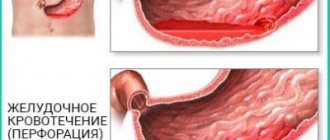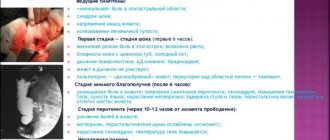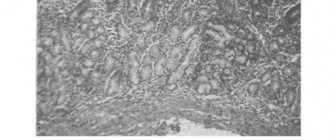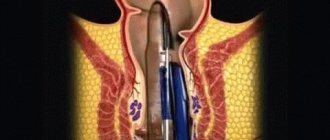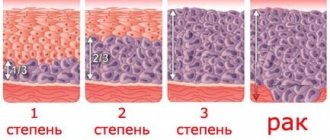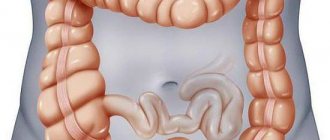What is infectious gastritis
Infectious and other gastritis is a long-lasting inflammation of the gastric mucosa, characterized by atrophic changes in the mucosa and impaired regeneration.
If the disease is infectious and caused by Helicobacter, the disease develops and progresses quickly. However, the mere presence of bacteria in the human body is not enough. Often the bacterium is secretly present in the organ without showing itself. An infected person may not suspect that he is a carrier of a dangerous pathogen. As a rule, improper or unhealthy food, prolonged stress, bad habits or poor hygiene become a favorable environment for the activation and further proliferation of Helicobacter.
When infected, a special enzyme neutralizes the aggressive effects of stomach hydrochloric acid, and the bacteria begins to act actively. With the help of “antennae”, it cuts into the gastric mucosa and settles comfortably on the walls. The bacterium then captures and sucks nutrients from the mucosal cells, releasing harmful toxins into the body that destroy the protective lining of the stomach. When destroyed, the mucous membrane no longer protects the walls of the stomach from exposure to an acidic environment, and persistent inflammation occurs.
Infectious gastritis
Symptoms of infectious gastritis are often similar to those of non-infectious gastritis. Minor manifestations of dyspeptic disorder or pronounced pain symptoms occur. Often the disease can be asymptomatic.
Is it possible to get a stomach ulcer?
If earlier the main reason for the development of ulcers was considered to be poor diet, now, when talking about whether a stomach ulcer is contagious, experts answer - yes. Stomach diseases arise due to the activity of the bacterium Helicobacter pylori - this was recently discovered. The Nobel Prize was awarded for this discovery. Initially, colleagues did not support the idea of Australian scientists about the possibility of bacteria existing in the stomach, since gastric juice contains hydrochloric acid. Then scientist Barry Marshall drank artificially grown Helicobacter pylori. Two weeks later he developed gastritis, and examination showed the presence of a microorganism in the stomach.
Helicobacter activity leads not only to the development of ulcers. The bacterium causes gastritis, erosions, and duodenitis. It also acts as a provoking factor for the development of cancer of the stomach and intestines. According to studies, in 10-15% of patients the ulcer becomes malignant - i.e. turns into a cancerous tumor.
At first, the presence of the microorganism does not produce pronounced symptoms. The bacterium damages the mucous membrane, resulting in an inflammatory process at the site of the lesion. Its activity is greatly influenced by the human immune system - with good protective mechanisms, Helicobacter pylori may not manifest itself for a long time. However, under favorable conditions, it multiplies quickly and rapidly destroys the mucous membrane, releasing toxins. In healthy people, the bacterium does not become active for a long time.
It is possible to become infected with bacteria, which often causes ulcers.
Are HIV infections transmitted through saliva?
Diseases transmitted through saliva are not a myth and, alas, not just another horror story from the guardians of morality. Kissing transmits many diseases - both primitive and easily treatable, and quite serious and dangerous. Salivary fluid is an ideal environment for pathogenic microorganisms to live and reproduce.
The risk especially increases if there are injuries and wounds in a person’s mouth - even an injury invisible to the eye will be enough for a microbial or viral agent to penetrate the blood.
Composition, functions and significance of human salivary enzymes
The most dangerous are the so-called “French” kisses, which involve prolonged contact between the open mouth and the partner’s open mouth, often with the tongue penetrating the oral cavity. Children's kisses on the cheek can be considered absolutely safe from a medical point of view.
What diseases are transmitted through saliva? Pathologies that can be picked up from a banal kiss are usually divided into viral and bacterial. The first includes the following list:
- cytomegalovirus infection;
- Infectious mononucleosis;
- herpes simplex;
- influenza and other acute respiratory viral infections;
- hepatitis B (rare);
- papillomavirus infection.
In addition to them, through a kiss on the lips you can become infected with such bacterial diseases as:
- peptic ulcer;
- bacterial meningitis.
We should not forget that caries, which occurs in almost every 3 people, also has a bacterial origin. To say that it can be transmitted through a kiss is not entirely correct, since in the development of the carious process it is not the microflora that plays a large role, but the level of oral hygiene, the ratio of microelements in the body, excess consumption of carbohydrates, and so on.
However, in children under 3 years of age, the regularity of brushing their teeth is usually poor, and the immune system is not yet able to work at full strength, protecting the baby from the penetration of pathogenic agents. How does bacteria transfer occur in this situation? Here, infection with streptococci from older relatives occurs: the child receives his share of bacteria through a kiss, as a result of which dental problems arise in the future.
Is HIV infection transmitted through human saliva?
Despite many stories of one partner infecting the other with HIV through saliva, scientific research suggests the opposite. In the entire history of HIV disease, only one incident has been recorded that cast doubt on the safety of an ordinary kiss. It is based on the testimony of one married couple who claimed that they had a protected sex life.
Later it was found out that the husband suffered from drug addiction and could easily share hygiene items with his wife (for example, a razor), use a common syringe for veins (in this case, the virus entered the wife’s body through the blood), and also not use condoms at all . So the real circumstances of the infection still remain unclear, and scientists claim that you can become infected with AIDS through a kiss only if there are open bleeding wounds in the mouth and a very high level of the pathogen in the blood of one of the partners - that is, it is practically impossible.
The benefits of kissing
But if you and your chosen one do not have infections, kissing, on the contrary, will only improve your health.
You will lose weight: a kiss that lasts longer than a minute is equivalent to a 500-meter run.
You will receive a pain reliever: when you kiss, the hormone endorphin is produced - this reduces headaches and even toothaches.
You will get rid of tooth decay: scientists from Chicago have found that kissing produces more saliva. And phosphorus and calcium, which are contained in its composition, reduce acidity in the mouth and prevent the development of caries.
You will also get rid of wrinkles: a passionate kiss uses 39 facial muscles. This is great gymnastics for the face.
Improve the condition of your skin: “During a kiss, breathing increases three times,” says Nino Gogiberidze, a dermatovenerologist and cosmetologist at the K 31 clinic. “Therefore, the blood is enriched with oxygen and flows better to the skin.
As a result, she says, the skin condition improves, stress is relieved and mood improves.
Unfortunately, when asked whether a stomach ulcer is transmitted through a kiss, doctors answer in the affirmative. Spread of Helicobacter through saliva is one of the most common ways of transmitting a microorganism from person to person. When kissing their loved ones, people do not think about the possible dangers, however, this is how the bacterium penetrates from an infected person to a spouse or children.
Today, peptic ulcer disease caused by the proliferation of Helicobacter pylori can be successfully combated. Treatment consists of killing bacteria and includes antibiotics and drugs to reduce acidity. Relapses in these cases are extremely rare - 3%.
Unfortunately, old methods of treatment are often used - i.e. only drugs that affect acidity. Thus, the results of bacterial activity are eliminated, but their presence in the body is not affected. Therefore, after a short time, the effect of therapy disappears.
Identification and timely elimination of Helicobacter pylori is important not only for the condition of the digestive system. Patients in whom microorganisms are detected are more likely to experience iron deficiency anemia, vascular diseases and blood diseases, and skin pathologies.
Despite the high dependence of the development of ulcers on the penetration of Helicobacter pylori into the body, the influence of other factors cannot be ignored. Heredity and stress conditions play a major role, against the background of which the disease progresses much faster. No less dangerous are bad habits, of which smoking is especially prominent.
Under the influence of nicotine, the production of hydrochloric acid increases, and vasoconstriction leads to disruption of the nutrition of the organ cells and its protective functions. When a disease is diagnosed, it is important not only to take medications, but also to take care of your emotional health. It is also important to follow a diet and eat 5-6 small meals a day.
Source
You can get infected through saliva from a kiss
Source
Methods of infection
Whether gastritis can be transmitted from person to person is a burning question. The disease caused by the activity of the bacterium Helicobacter pylori is infectious in nature, the possibility of transmitting the bacterium to others seems real. Accidental infection awaits healthy people everywhere.
Doctors answer the question in the affirmative. Scientists identify several routes of infection with infectious gastritis. According to medical statistics, 2/3 of the world's population is already infected with Helicobacter. Infection most often occurs in childhood. How does transmission of infection occur:
- Airborne droplets, through saliva or household contacts.
- Through common items, for example, tableware.
- Through personal hygiene items.
- Through medical devices.
If symptoms of gastritis are noted in all family members, gastroenterologists recommend undergoing a single course of treatment. Even if the characteristic signs of Helicobacter infection are not noticeable, it is recommended to take a test for the bacterium. It happens that treatment of gastritis in one family member does not produce positive results.
The serious danger of the Helicobacter pylori bacterium lies in the fact that if it is constantly in the body and in suitable conditions, the microbe can provoke the development of stomach cancer. Many gastrointestinal cancers are associated with the presence of bacteria. Taking a test for Helicobacter and getting rid of the danger in time will not be superfluous, even if no obvious symptoms are visible.
Infectious gastritis is transmitted through kissing, which poses a certain danger.
An important aspect in considering infectious gastritis is the possibility of inheritance of gastritis. A rare chance, but present in a select group of potential patients. Often at the initial appointment, gastroenterologists ask whether a relative has stomach cancer. Some doctors and scientists are convinced that it is possible to transmit a certain gene that causes gastritis from parents to children.
Don't be careless about your health. Medical practice shows that in a family with a member suffering from stomach cancer, it is quite possible for the disease to recur in the family. The chance is especially high if relatives live nearby - transmission of Helicobacter is possible at the household level, including kissing. However, there is no direct connection; it is impossible to inherit gastritis directly. The situation depends on a number of factors.
Can gastritis be diagnosed by breathing?
Gastritis cannot be detected by breathing. Using a breath test, you can determine the presence of the pathogenic bacterium Helicobacter, which is the most common cause of gastritis. Indirectly, we can assume that if there is Helicobacter in the stomach, then there is gastritis. However, a breath test very often gives so-called false positive results, that is, the examination result shows that the bacteria is present, but in fact it is not. That is why this type of examination is used for so-called screening diagnostics. That is, after identifying a positive result, it is necessary to conduct a confirmatory examination - gastroscopy.
What's the result?
Based on the above data, gastritis is contagious. As modern medical research has shown, the causative agent of gastritis is the infectious bacterium Helicobacter pylori. The microbe is dangerous, under certain favorable factors it causes a lot of trouble, leading to the development of cancer in the patient.
Helicobacter is easily transmitted from a sick person to a healthy person. Transmission occurs through household contacts, kissing or intimate caresses. If a family member has been exposed to the disease, it is worth limiting his tactile contact with his family for a certain time.
In selected cases, gastritis is inherited. It is considered possible that the gene for predisposition to gastritis can be passed on from parents to children. You should pay close attention to your health if you have a family relative with stomach cancer or another gastrointestinal cancer. Living conditions and contact with infected people will seriously affect health.
Gastritis is a complex disease that can be transmitted from a sick person to a healthy one. At the first symptoms, you must undergo a full course of examination by a doctor.
Is gastritis inherited?
Not entirely correct. Most often, the presence of gastritis in relatives is explained by the following reason. In most cases, gastritis is caused by a pathogenic bacterium - Helicobacter. It is transmitted through everyday contact, that is, through hands, dishes, and saliva. Within a family, transmission of this microorganism to each other is not difficult. That's what happens. Someone brought the bacteria Helicobacter, and gastritis developed as a result. He then passes it on within the family to his spouse, children or even grandchildren. They, in turn, also develop gastritis. As a result, when we see gastritis in a grandfather, father and son, it seems that gastritis is inherited. If one of the family members is diagnosed with gastritis, he must undergo examination to identify Helicobacter. And if she is found, then all family members must be examined. After successful treatment, there are no thoughts about heredity.
